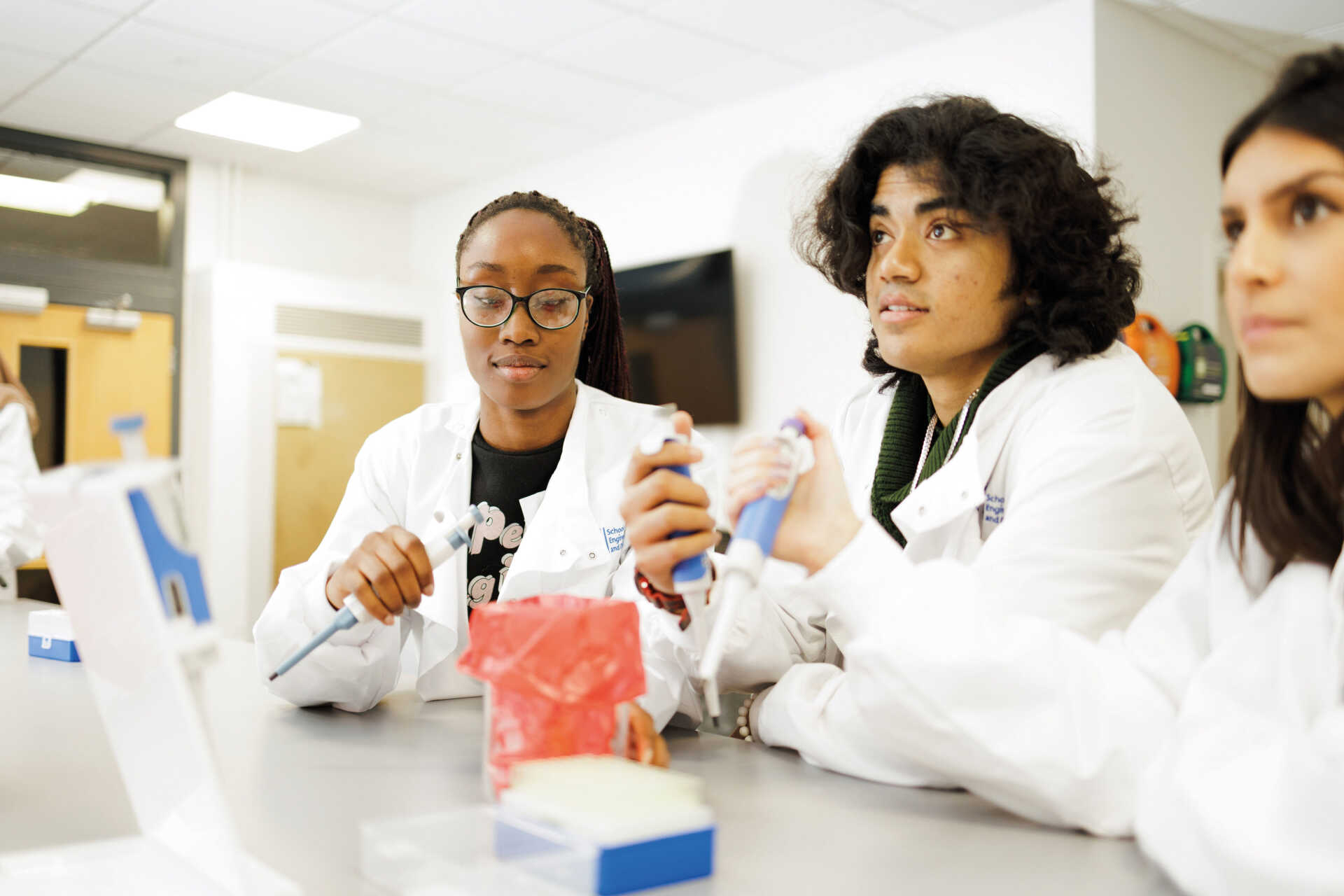
At the University of Kent, we recognise the importance of employers being at the centre of apprenticeships. For that reason, we’ve worked hard to build our apprenticeship offer around employer need and preferences. Our delivery models have been built in partnership with employers to meet national upskilling needs.

Our Level 7 Research Scientist Apprenticeship offers three routes.
All apprentices will follow the Level 7 Research Scientist Apprenticeship Standard, with the option to 'top-up' to an MSc qualification upon completion of the Apprenticeship End-point Assessment:
Route 1 – Level 7 Research Scientist Apprenticeship
Route 2 – Level 7 Research Scientist Apprenticeship and MSc in Applied Drug Discovery and Development
Route 3 – Level 7 Research Scientist Apprenticeship and MSc in Applied Drug Discovery and Development (Advanced Research)
Please note, there is currently no option to study the MSc routes without entering the Level 7 Research Scientist Apprenticeship.
Apprentices enrolling on this programme are expected to have a good undergraduate degree (2:2 or above) in a relevant biological science discipline.
You need to hold a GCSE in English and Maths (or equivalent qualification).
However, applicants without these qualifications will be looked at on a case-by-case basis and any evidence of previous study and work-placed experience will be taken into consideration.
Route 1
Level 7 Research Scientist Apprenticeship is studied part-time over 104 weeks, plus 3 months for End-point Assessment. It is divided into 3 stages and comprises of 5 modules and EPA.
Route 2
MSc in Applied Drug Discovery and Development is studied part-time over 104 weeks plus 3 months for End-point Assessment. Learners following this route will typically require an additional 12 weeks for additional MSc. It is divided into 4 stages of 6 modules and EPA.
Route 3
MSc in Applied Drug Discovery and Development (Advanced Research) is studied part-time over 104 weeks plus 3 months for End-point Assessment. Learners following this route will typically require an additional 12 weeks for additional MSc. It is divided into 4 stages of 4 modules and EPA.
The course is delivered online using a platform called Moodle. There are not set days for lectures, but apprentices will need 1 day per week (or 8 hours) to complete online study.
The Level 7 Research Scientists have face to face teaching each year at two ‘Intensive Weeks’. The Intensive Weeks usually run Monday – Thursday in late July.
Stage 1
Apprentices take the following compulsory modules:
Stage 2
Apprentices take the following compulsory modules:
Optional modules (apprentices must select one of the following optional modules):
Stage 3
Stage 1
Apprentices take the following compulsory modules:
Stage 2
Apprentices take the following compulsory modules:
Optional modules (apprentices must select one of the following optional modules):
Stage 3
Stage 4
Stage 1
Apprentices take the following compulsory modules:
Stage 2
Apprentices take the following compulsory module:
Stage 3
Stage 4



We offer start dates in September, October, January, and May for this programme. The cut-off for applications is normally one month prior to the course starting.
The cost of the apprenticeship is £18,000 per apprentice and this can be paid for from the Apprenticeship levy or by government co-investment funding which covers up to 95% of the fees.
There is also the cost of accommodation and travel for Intensive Weeks. This should be funded by the employer and is not payable from apprenticeship levy or government funding.
There is an additional fee for those following routes 2 and 3 who wish to achieve an MSc alongside their apprenticeship. The top up fee cost is £1250 per learner and can be paid by the employer or the apprentice.
Payment plans may be available to help spread the cost of this, please speak to us about this when enquiring.
The Royal Society of Biology, the Institute of Physics, and the Royal Society of Chemistry offer an expedited route to achieve Chartered status (Chartered Biologist, Chartered Chemist, or Chartered Physicist) through this apprenticeship. This is because the apprenticeship closely aligns with many of the competencies required for Chartered status.
To be considered for Chartered status, individuals must have a relevant degree or equivalent at the start of the apprenticeship. During the apprenticeship, you can become a member of the Royal Society of Chemistry (RSC) or the Royal Society of Biology (RSB). After completing the apprenticeship, you can upgrade your membership to Chartered Chemist (CChem) status through the professional development plan (PDP) route.

If you have any questions about Kent programmes, need help selecting the right apprenticeship or require information on funding, timelines and more, please don't hesitate to reach out.
We're always here to help you navigate through the process.
